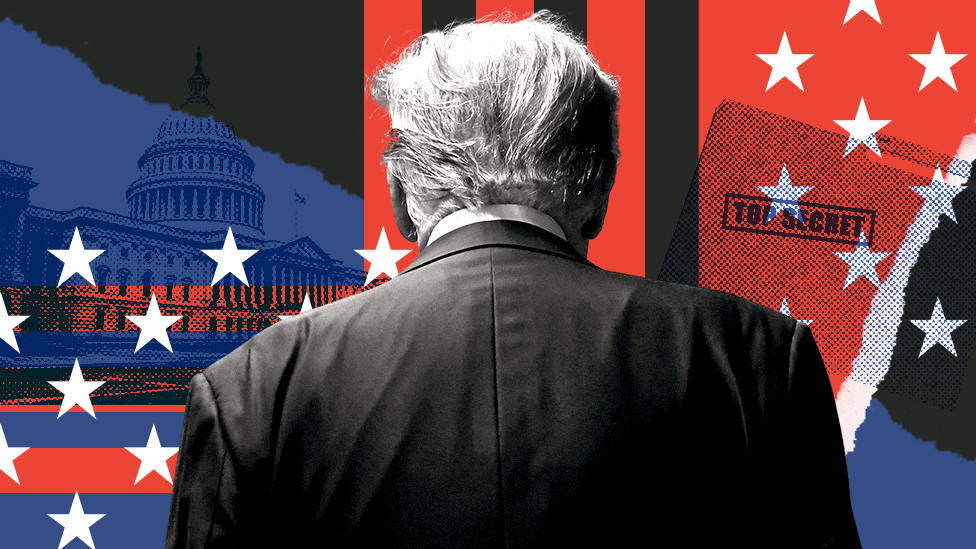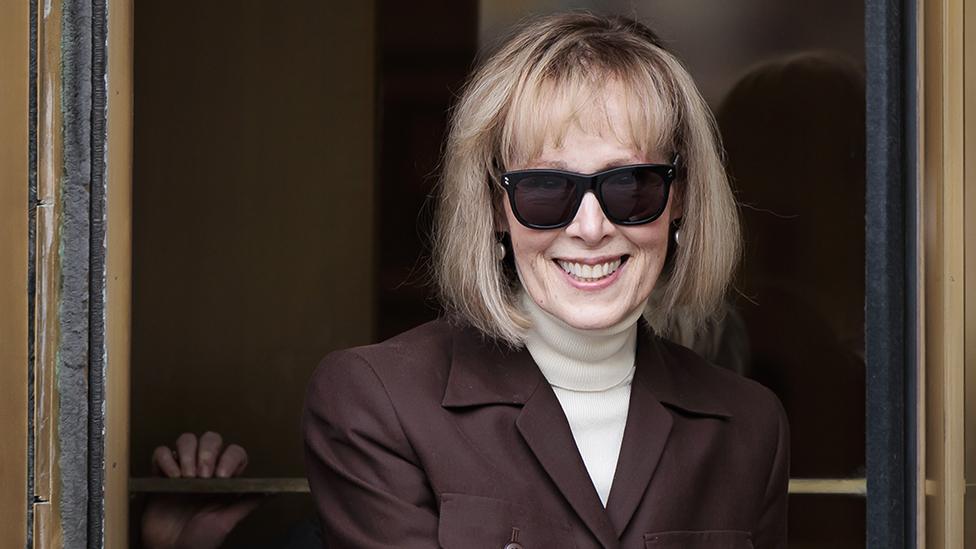Trump talks Ukraine and pardoning Capitol rioters in CNN town hall
- Published
Ever since Donald Trump left office in January 2021, he has stayed in a cocoon of friendly right-wing media and his rally crowds of devoted supporters.
But the former president, who is running again in 2024, ventured outside of that bubble on Wednesday for a 90-minute townhall event on CNN.
His appearance on the cable news outlet, which he has repeatedly called fake news, was at times chaotic and would have been familiar to anyone who followed him as he scorched a path to the White House in 2016.
It also came just a day after a New York jury found him liable for sexually abusing the writer E Jean Carroll in a department store in the city almost 30 years ago.
Here are six takeaways from the evening.
1) A man who can't let 2020 go
The event was moderated by CNN host Kaitlan Collins and featured a live audience made up of Republicans and some independents.
They gave him a standing ovation as he entered.
The former president's first question from Ms Collins was an open-ended one about why Americans should return him to the White House. Instead of answering with a criticism of Democratic President Joe Biden or outlining his campaign platform, he quickly launched into an attack on the 2020 election.
He rehashed debunked claims of ballot-box stuffing and voter fraud, and called it a "rigged election". When Ms Collins pushed back, he said she was smart enough to know better and accused her of having an agenda.
The extended exchange once again demonstrated that the central motivating factor behind Mr Trump's 2024 presidential bid continues to be relitigating his 2020 defeat. It's the one thing he can't let go.
While that may be music to the ears of his loyal base, general-election voters - and even some Republican primary voters - may be hoping to move on.
Watch: Trump confuses his wife with E Jean Carroll
2) Mocking the E Jean Carroll case
Mr Trump was asked directly about Tuesday's verdict in the E Jean Carroll civil case, when he was ordered to pay about $5m (£4m) in damages for sexual abuse and defamation.
He repeatedly denied having any contact with the writer despite a photo emerging of them together. "I don't know her. I never met her. I had no idea who she is," he said.
The audience in New Hampshire then laughed as he mocked Ms Carroll's claim and called it "fake news".
While Ms Collins pressed the former president for answers on different topics throughout the event - at one point so rattling him that he called her a "very nasty person"- the crowd were clearly in his corner.
They were a living, breathing reflection of the hold Mr Trump continues to have over the Republican Party - and the obstacles his opponents will have in trying to wrest the 2024 nomination from his grip.
"I like you guys," the former president told the crowd at the end of the forum. The feeling was mutual.
3) A debt ceiling default ultimatum
Republicans and Democrats in Washington are in the middle of tense negotiations over raising the legal debt limit in order to avoid a default on the national debt.
On Wednesday night, however, Mr Trump said that going over the debt cliff for the first time in US history may be a necessary step if Republicans don't get the broad spending cuts they desire.
"If they don't give you massive cuts, you're going to have to default," he said.
The view matches those of some conservative Republicans in Congress who believe the US is already on a course that will end in default and disaster if budget changes aren't made.
"You're going to default eventually anyway," he said, "but it's going to be much messier."
Watch: The debt ceiling explained - in under 90 seconds
That message will resonate with some Republicans and will certainly strengthen the spines of Republican hard-liners. The chances of an actual default next month - which economists warn would have catastrophic consequences for the US and the world - may have just ticked up.
4) Not picking a side in Ukraine
Over the course of the past few months, Mr Trump has said that Russia would have never invaded Ukraine if he were president and if he is returned to office he will negotiate a settlement in Ukraine within 24 hours.
He repeated those lines on Wednesday. When pressed, however, the former president repeatedly refused to say who he would like to prevail in the Ukraine conflict.
"I don't think of winning or losing, I think in terms of getting it settled," he said. "I want everybody to stop dying."
He added that he thought Russian President Vladimir Putin made a mistake in invading Ukraine but, when asked, would not label him a war criminal.
Surveys show that Republicans are growing increasingly sour on US support for Ukraine's war effort. The town hall crowd gave repeated and energetic applause for Mr Trump's lines on Ukraine.
While some Republican officeholders and the Biden administration may pledge continued support for Ukrainian President Volodymyr Zelensky, it's increasingly clear a second Trump presidency would mark a decided shift in US policy.
5) Muddy waters on abortion
For conservative evangelical voters, one of Mr Trump's most notable achievements as president was appointing Supreme Court justices who ultimately reversed Roe v Wade abortion protections.
On Wednesday night, Mr Trump took credit for that - but he repeatedly dodged when asked about what he wanted to happen next on the issue of abortion.
Would he support a federal ban? Does he think abortion should be restricted after six weeks of pregnancy, as some Republican states have done? Or more? Or less?
As many times as Ms Collins pressed, Mr Trump wouldn't give a firm answer, only saying as president he would consider the issue and do "what's right for everybody".
When it comes to abortion, however, there's no answer that will make everybody in American happy.
After Republicans underperformed in the congressional midterm elections last year, Mr Trump said that he thought the issue, and the conservative hard-line positions on it, cost the party votes.
On Wednesday night, he seemed determined to keep his answers as vague as possible.
6) Capitol riot pardons
At a recent campaign rally in Texas, Mr Trump played a video that showed prisoners awaiting trial for the 6 January 2021 attack on the US Capitol singing the national anthem. It was interspersed with footage of the attack and of Mr Trump reciting the Pledge of Allegiance.
On Wednesday night, the former president leaned further into sympathising with those who participated in the attack.
He pledged to pardon "many" of those convicted of 6 January offences. He again lionised Ashli Babbitt, who was killed trying to break into a room near the House of Representatives chamber. He called the Capitol Hill security officer who shot her a "thug".
More broadly, he defended his actions that day, producing several sheets of paper with statements and tweets which he said showed he urged protestors to be peaceful.
For as long as Mr Trump seeks public office, questions about the Capitol riots - and his role in it - will follow him.
Many Republicans, including officeholders who were at the Capitol that day, consider it a dark moment in American history. For them, Mr Trump's attempts to recharacterise that day may strike a sour note.
Find out more

You can hear more of Anthony's analysis by tuning into Americast, the BBC's US politics and culture podcast, on BBC Sounds or wherever you get your podcasts
And you can follow Anthony on Twitter , external

Related topics
- Published28 August 2024

- Published9 May 2023
- Published10 May 2023

